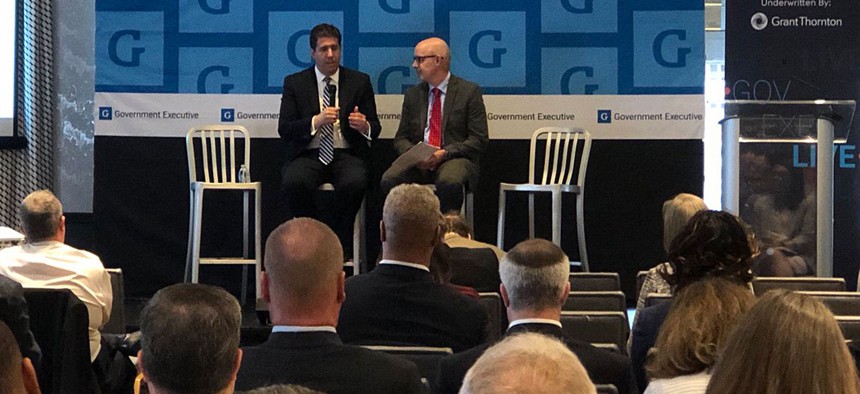
OPM Deputy Director Michael Rigas (left) speaks during a GovExec Live event Thursday. OPM
OPM Official: Merger With GSA Won't Be As Disruptive as Some Might Fear
Personnel agency will retain its Senate-confirmed director and likely its office building, deputy director says.
Office of Personnel Management Deputy Director Michael Rigas confirmed Thursday that under a proposal to send most of OPM’s operations to the General Services Administration, the director of the government’s HR agency would remain a Senate-confirmed position.
Speaking at a GovExec Live event, Rigas stressed that the proposed merger would enable better performance of OPM’s transactional duties and thus free leadership up to take on pressing governmentwide workforce issues.
“A lot of the transactional work OPM does, from annuity checks and health care to retirement, a lot of it is just real transactional work that would be better suited to a back-office type of agency,” Rigas said. “This will allow the core of OPM to focus on what it was meant to focus on: human capital strategy, and how to have a workforce for the 21st century, rather than tracking down retirement checks.”
Acting OPM Director Margaret Weichert said earlier this week that she would unveil a legislative proposal to authorize the merger “hopefully” by Friday. Rigas said that officials are hopeful that members of Congress would be receptive to the plan, although he noted that the administration is ready to do what it can to facilitate the change administratively.
“There’s a lot that can be done administratively through delegation of authority, subcontracting, and through having GSA take on additional activities that OPM is not required by statute to do,” Rigas said. “Obviously it would be helpful to have some legislation, because there are some things that you have to do in an inelegant way if done administratively, but everything is legally within the bounds of the law, and there’s no question there.”
Jason Briefel, executive director of the Senior Executives Association, told Government Executive that he believes a document outlining the administration’s “case for change” at OPM highlights the “business case” for reforming the agency, but is noticeably silent about why the merger is necessary from a policy perspective.
“I think from a purely business case standpoint—finances and operational—there’s a pretty solid business case here in that regard,” Briefel said. “But, and I think the ‘but’ is where we and many others are going to focus, this fails to even mention the statutory independence that Congress established when they created OPM and the other independent civil service agencies with the Civil Service Reform Act of 1978 . . . This is government. Business cases alone are not enough.”
Asked about why the merger was necessary, rather than efforts to reform OPM while maintaining its independence, Rigas stressed the need for a “stronger IT environment” offered by GSA and suggested the change won’t be as disruptive as some fear.
“I think change is always something that is, there’s a lot of change in life, but . . . we’ll all still be working in the federal government,” Rigas said. “We’ll still report to the OPM director as part of GSA once the merger is complete, and I’d say that most will continue to work in the same building as today. The uncertainty that people may feel around change, that it might cause a feeling of disruption, we’re talking with them about what the actual change will be, and that the work they’re doing today will still be needed tomorrow.”
NEXT STORY: Trust Isn’t Simple When It Comes To Government







